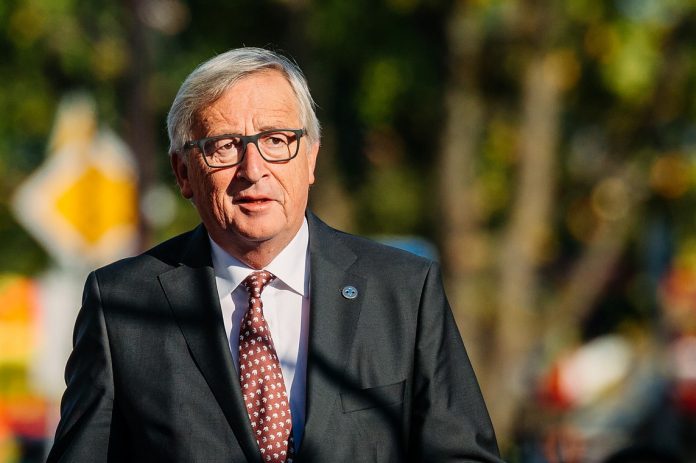It’s time for the European Union to flex its muscles as a “global player”, according to European Commission President Jean-Claude Juncker.
In his State of the Union speech on September 12, he called for the EU to speak and act as one on a global stage, defend its democratic values and turn its back on poisonous nationalism.
“There are no guarantees that our allies of yesterday will remain our allies of tomorrow”, said Juncker. He announced further proposals to strengthen the Defence Union, step up protection of EU external borders and reinforce the Euro as an international currency.
“It is absurd that the EU pays 80 % of its bill for energy imports in dollars… whilst only 2% of those energy imports come from the US,” he said.
Juncker highlighted the difference between enlightened patriotism and unhealthy nationalism. “Article 7, must be activated where media freedom and the rule of law are under threat”, he said. “There is no democracy without a free press… Respecting judiciary decisions is not an option, but an obligation”.
Reactions to Juncker’s speech
The president of the European People’s Party (EPP), Joseph Daul, welcomed Juncker’s State of the Union assessment and expressed his full support for the proposals presented. “Under the leadership of President Juncker, Europe has registered 21 consecutive quarters of economic growth, 12 million jobs have been created since 2014, youth unemployment has been reduced to its lowest level since 2000 and, through the European Fund for Strategic Investment, almost €400bn investment have stimulated across our continent.
“Despite our achievements,” added Daul, “the internal and external challenges that Europe faces today are considerable. Our response to these challenges will be crucial to the future peace and prosperity of our union. It must be one of unity not division, openness instead of nationalism and solidarity instead of egoism.”
According to S&D president, Udo Bullmann, the EU needs some radical changes to reinvent itself. “The change that we need means, first and foremost, a transformation of our economic and social model. Our economies have to work for the many, not just the few. Economic success has to be measured not only in euros, but also in social and ecological terms. If the Commission wants to protect people, as Juncker claims, they need to come forward with a package to fight inequalities including, for example the Child Guarantee that ensures that children can learn and thrive in a healthy environment.”
Taking Juncker to task over his record at the State of the EU debate at the European Parliament, GUE/NGL President Gabi Zimmer said he would be remembered for failing to tackle inequality and defend the rights of the majority.
“Are we in a position to say we’ve got over the economic crisis? Are we in a position to say we’re prepared for all the challenges of the future so that our citizens have social security and solidarity? The answer is a clear ‘no’. The response to the crisis has hit the poorest hardest, and has meant that inequality has become deeper,” said Zimmer.
She also noted that years of austerity caused untold damage to workers’ rights and social protection in the EU. “The level of prosperity of the pre-crisis era has still not been reached with few citizens benefitting from tentative growth.”
During his turn to comment, European Green Party co-chair Reinhard Bütikofer said Juncker presented some headline-grabbing initiatives, such as the European-African Pact for Sustainable Investment and proposed new measures to reinforce existing European policies. But that was it.
“Juncker was unable to explain how the necessary push for a better Europe, that he would want to see, should come about. The concept of a ‘Europe that protects its citizens’ is too limited. Europe can only protect its citizens, if it strengthens them. Only Europeans themselves can build the Europe of tomorrow.”
On climate change
The European Environmental Bureau (EEB) welcomed Juncker’s expressed wish to “leave a healthier planet behind for those that follow” but regrets that this has played little part in guiding his policies and priorities over the past four years.
The EEB appreciates that Juncker used part of his State of the Union speech to emphasise Europe’s commitment to climate action and to tackle the scourge of plastic pollution.
His parting words in particular set out a vision for leaving a healthier planet behind saying: “The trees we plant today must provide shade for our great grand-children whether they hail from East or West, from South or North. To give them all they need to grow and breathe easily.”
Jeremy Wates Secretary General of the European Environmental Bureau (EEB) said: “While it is heartening to hear President Juncker stress the importance of climate change and present a vision of a Europe which helps create a better world for future generations, his track record on environmental issues has been poor. He should now use his remaining months in office to step up the ambition on concrete policies that will lead to a healthier planet.”
On Sustainable Development, Patrizia Heidegger, the EEB’s Director of Global Policies and Sustainability, said: “Three years after the international community agreed on the 2030 Agenda and the Sustainable Development Goals, President Juncker still refuses to bring himself to even mention sustainability or the Global Goals. This is deeply worrying as we need to bring the Sustainable Development Goals to the heart of policymaking at the European Union and Member State level.
The EEB is Europe’s largest network of environmental organisations with around 140 members in over 30 countries.

